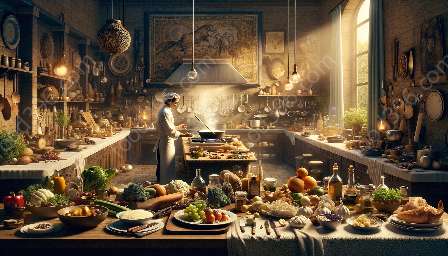French cuisine holds a revered place in the culinary world, known for its rich history, diverse flavors, and intricate techniques. From its ancient origins in the Gaulish and Roman periods to the modern fusion of traditional and contemporary influences, the evolution of French cuisine has played a significant role in shaping not only European cuisine but also the global gastronomic landscape.
The Gaulish and Roman Foundations
The history of French cuisine can be traced back to the ancient Gaulish and Roman periods. The Gauls, who inhabited present-day France, had a diet based on grains, wine, and dairy products, while the Romans introduced new ingredients such as herbs, meats, and olive oil. This fusion of indigenous and Roman culinary traditions laid the groundwork for the diverse and flavorful cuisine that would evolve in the centuries to come.
The Influence of Middle Ages and Renaissance
During the Middle Ages, French cuisine was heavily influenced by the feudal system, leading to distinct culinary styles based on social classes. The nobility indulged in elaborate feasts with an abundance of meats, game, and spices, while the commoners relied on simpler fare such as grains, vegetables, and legumes. The Renaissance period brought about a culinary revolution as trade routes expanded, introducing new ingredients such as sugar, citrus fruits, and exotic spices, which enriched and diversified the French palate.
The Age of Enlightenment and Haute Cuisine
The 18th century marked the Age of Enlightenment in France, a time of intellectual and cultural advancement that extended to the culinary realm. Philosophers and gastronomes sought to refine and elevate French cuisine, leading to the emergence of haute cuisine, characterized by intricate techniques, elaborate presentation, and an emphasis on luxury ingredients. This era saw the birth of iconic French dishes and the codification of culinary arts, setting the stage for the global influence of French gastronomy.
The Modern Era and Global Impact
In the modern era, French cuisine continues to evolve, embracing both tradition and innovation. The 19th and 20th centuries witnessed the rise of renowned French chefs, such as Auguste Escoffier and Paul Bocuse, who shaped culinary techniques and restaurant culture. French culinary schools, such as Le Cordon Bleu, became epicenters of culinary education, attracting aspiring chefs from around the world. French cuisine's global impact is evident in the widespread adoption of French culinary terms, techniques, and dishes in international gastronomy.
French Cuisine and European Culinary Heritage
French cuisine has significantly influenced the broader landscape of European culinary heritage. The exchange of ingredients, culinary techniques, and cultural influences across European borders has resulted in a rich tapestry of flavors and traditions. French culinary techniques, such as sautéing, braising, and baking, have become fundamental pillars of European cooking. Similarly, iconic French dishes, such as coq au vin, ratatouille, and bouillabaisse, have become celebrated classics that resonate throughout European culinary traditions.
French Cuisine's Enduring Legacy
The enduring legacy of French cuisine lies in its ability to blend tradition with innovation, sophistication with simplicity, and regional diversity with a shared gastronomic identity. From grand Michelin-starred establishments to quaint bistros and patisseries, the culinary landscape of France continues to captivate and inspire food enthusiasts worldwide, cementing its position as a timeless beacon of gastronomic excellence.

